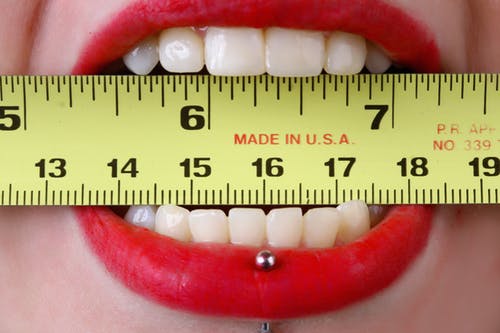Anybody can restrict their food intake to lose weight in the short term, but what happens 5-10years down the track?
Do we keep the weight off and more importantly if we do does that actually improve our health?
This is where things become less clear because while the success of a diet is traditionally measured by the number on the scale and there is an undeniably hefty emphasis on weight loss and being lean as a means of improving health or signifying health respectively to the point where most of us have never considered questioning this, there is plenty of data out there showing there’s more to the story.
Much of the information we do have indicates most people who “diet”, that is intentionally eat less with the purpose of losing weight, completely regain the weight they lost and oftentimes more, within a year or two of losing it. On top of this there are many studies showing the weight loss they did achieve was actually associated with an increase in the very same negative health outcomes the weight loss was intended to prevent, as well as increased mortality.
The obvious question then becomes is weight loss useful, helpful or healthful? The short and truthful answer would appear to be no.
The longer and more accurate answer is, as is the case with anything to do with health, it depends.
The nuances of your circumstances and your uniqueness’s matter more than you think (or more accurately more than the $72 billion dollar US diet industry would have you believe) because even a quick perusal of the literature available on weight and health will show you that there is no hard and fast consensus.
In this post I am going to present some of the evidence behind a weight neutral approach to health, that is an approach to health that leaves out the blanket recommendation that weight loss or being lean makes you inherently healthier than you would be living in a larger body.
I am also going to offer some direct insight into what areas we can start channelling our energy as we let go of the weight obsession that will truly improve our health as well as where you can seek help to do this because health is not found hidden in the bottom of the latest protein powder or that 30 day shred/detox/cleanse aka diet by any other name. Health is a lifelong process and that’s a wonderous thing because you have the rest of your life!
This post is especially for you if you are someone who has struggled with less than positive thoughts, feelings or behaviours around food and your body or believe deeply that weight is tied to your health or worth as a human being, so much so that this thought sequence has become your norm.
What Do We Know About Weight & Health?
Weight & Mortality

Weight and Mortality
When it comes to weight and health the only thing, we do know for sure is that there is no health to be found in being “underweight”. The evidence behind this is irrefutable.
Technically underweight is defined as a body mass index (BMI) less than or equal to 18.5kg/m2 and therefore this is the number all the studies generally site, however in my real world experience underweight is weighing less than the weight your body naturally wants to be.
There are numerous studies which show being underweight is associated with poor health and increased mortality, including a 2017 study which showed that being underweight (BMI<18·5 kg/m2) was significantly associated with risk for all-cause mortality, as compared with normal weight (BMI=18·5-22·9 kg/m2). This same study showed obesity (BMI> or =30·0 kg/m2) was not associated with excess mortality risk1.
Furthermore, a systematic review and meta-analysis involving more than 2·88 million participants with 270 000 deaths in a combined ninety-seven cohort studies from across North America, Europe and other countries showed overweight (BMI=25·0-29·9 kg/m 2) was significantly associated with lower risk of all-cause mortality while obesity class I (BMI=30·0-34·9 kg/m2) was not associated with higher mortality risk compared with normal weight (BMI=18·5-24·9 kg/m2)2.
Weight & Disease Risk

It has been pretty broadly accepted for years now that obesity is a risk factor for metabolic complications including high cholesterol, type II diabetes and high blood pressure3-5. However, what we also know is that many people are overweight or obese and do not show these or other detrimental symptoms6-13.
Interestingly, a recent study showed insulin sensitivity levels significantly deteriorated by approximately 13% in obese but otherwise metabolically healthy individuals after a 6-month restricted caloric diet14. Clearly demonstrating that weight loss itself in the absence of other comorbidities or risk factors is not always a good thing even in those who would be considered obese.
The Verdict: “Can You Really Be Healthy at Every Size?”

So, in answering the question “can you really be healthy at every size” the answer is most likely nope, not really. However, contrary to popular opinion it is being at a lower weight, rather than a higher weight, which actually carries the greater health risk.
What I’ve also learned, both through my personal experience of life with anorexia nervosa as well as my professional life as a Dietitian and being privy to hearing and seeing the effects of every possible thing a human being can do with their body and food is that health is not found in the extremes.
As with everything in life, it’s about balance.
What is also true is that health likely has less to do with the amount your body weighs than it has to do with your behaviours. This is crucial and is therefore, what I am dedicating the remainder of this post to, both introducing perhaps the top 6 most healthful behaviours you could ever adopt and more importantly how to actually do them because while having the right data is necessary oftentimes there’s a gap between knowing and doing and it is this gap which has become the focus and joy of my work.
Top 6 Healthful Behaviours That Will Change Your Life
Can you put aside your lifelong conditioning, university education or diet industry brainwash to accept for a minute that in the real-world leanness is not in and of itself an indicator of good health.
Some of the most unhealthy people I have worked with in regards to common measures of health including their cholesterol levels, brain scans, bone mineral density, mental clarity, cardiovascular disease risk and metabolic factors have been those who have looked, from the outside to be the epitope of what we’re told health is, six pack and biceps included.
So, if losing that 5, 10 or 20kg isn’t going to change your health what is? Here’s my top 6 suggestions you may want to shift your focus to, because if your goal truly is health, we know they are more impactful than weight for great health outcomes, in no particular order:
- Connection

To explain the science behind this one is simple we are social creatures. Back in the day of living in tribes to be an outsider almost certainly meant death. The need for human connection is biological and our brains are hardwired for connection and pain when we’re not in order to ensure we do our best to remain connected.
There is perhaps nothing more fulfilling and health promoting than to feel we belong and are accepted just as we are.
The famous “Blue Zone” studies in which scientists identified certain regions of the wold where people had unusually low levels of cardiovascular disease and lived the longest and attempted to account for this longevity through factors such as diet and exercise found the diets and activity levels were vast and varied and included high fat, high carb and certainly no intentional exercise in the way of today’s workouts. The one true thing they did show in common was the connectedness of the people.
Connection helps us live longer and healthier (and likely feel much happier doing it too!)
2. Purpose and Mission

Believing that your life has purpose and meaning no matter what this is has been shown to be an incredibly health promoting mindset. Probably because it allows for us to be much more resilient in the fact of adversity. When we believe there is something bigger outside of ourselves than our own pain in that moment we can find meaning in our struggles and rather than suffer learn and move on.
3. Eating Well

Being a Dietitian I cannot leave this one out because unquestionably what we eat affects our health.
Perhaps nowhere is the link between what we eat and our health more pronounced than during pregnancy or early infancy. All sorts of developmental complications can arise when a fetus is provided with insufficient maternal nutrition including the well-known neural tube defects such as spina bifida, due to low maternal folate intake.
However, to say what we eat is only important during growth is completely inaccurate. What we eat affects our health right down to the level of our DNA and studies now show our genes are up and down regulated according to how much nutrition we have on board. That is, we produce more or less of the product that gene codes for in response to what we eat. We are biological beings and as biological beings limited by our biology which is only ever going to be as great as what we have once eaten.
4. Movement

Movement is good for us, but this very much depends on the amount and type. Too much or too strenuous for you and it becomes harmful.
The movement guidelines in Australia suggest aiming for 20-30mins of gentle exercise at least 5 days a week as well as some form of strength or resistance exercise on a few days. This can be divided into walking for 10mins twice a day and yoga for 15-20mins a few other days of the week (If you want more information on exercise or identifying if you may be overdoing it click this link to check out my earlier blog 7 “Side Effects” No One Told You About Overexercising.
5. Time in Nature

Time outside is great for us. It allows us a moment to break focus from the everyday routine and breathe.
Time outside allows us a moment to step out of our logical, constantly processing mind, appreciate and simply be and there is nothing more generative and inspiring for our brain than to have moments in which we do this. It is the same reason hypnosis works so well in helping people overcome challenges they’d been stuck on “trying” to figure out for decades. Nature is hypnotising.
As well as this getting some sunlight on our skin helps with vitamin D production and in countries where there are prolonged periods of darkness insufficient vitamin D levels are in part responsible for the condition known as seasonal affective disorder characterised by low mood and depression. So, it’s important to happiness and having the motivation to care for yourself that you get enough vitamin D.
6. Sleep

Sleep always sounds like such a boring recommendation and one we feel we have less control over than something like eating or exercising so it’s easy to overlook but it is right up there on the same level of importance as any of these other health promoting and enhancing behaviours.
Sleep is the time in which our bodies repair and regenerate in ways they simply do not while we are awake. There is no equivalent.
Sleep is also the time we form and consolidate learnings and memories and there is ample evidence that being sleep deprived has enormous health consequences.
Knowing All This What Can I Do Now?

The problem is not, has never been and will never be your weight, we are all diverse in the size and shapes of our bodies and wouldn’t be here as a species today if this were not true.
You wouldn’t be healthier in a smaller body.
If you judge your relationship with food, movement or your body as a problem for you, in that it takes up a lot of your brain space on any given day or causes you stress to the point where it gets in the way of you doing the things you want to do or being the person you want to be, get help.
It truly does not need to be any more complicated than this. If there’s anything in your life you don’t like, get help to change it because there is no bravery in tolerating, enduring, downplaying or protecting others.
It may sound fanciful and even not possible but from someone who’s been there and from someone who now works on a daily basis with others struggling with their self-worth or identity being acutely tied to food, movement or their body I can tell you with complete and utter confidence that there is a better way and it’s available to you because at the end of the day any of the 6 healthy behavioural suggestions I’ve made above are only as healthful as your thoughts behind doing them.
Our intentions matter equally, if not more so than the actions themselves. There are plenty of people doing healthy behaviours for very unhealthy reasons.
Real health takes learning, it takes effort and it takes doing something different but if you consider the alternative (or the fact that perhaps you’ve already tried and tried again the alternatives) do you think it may just be worth giving it a go?
If I could recommend anything to all people who have ever experienced a moment of silent desperation in relation to your body or feelings it would be to research and find a skilled clinical hypnotherapist who is also qualified in nutrition. There really is no profession better positioned to amplify your uniqueness and amplify your ability to set yourself free of all that’s holding you back once and for all.
With my whole heart I hope you found this information useful and inspiring.

Become Great. Live Great.
Bonnie.
References
- Kee CC, Sumarni MG, Lim KH, Selvarajah S, Haniff J, Tee GHH, et al. Association of BMI with risk of CVD mortality and all-cause mortality. Public Health Nutr 2017 05;20(7):1226-1234.
- Flegal KM, Kit BK, Orpana H et al. (2013) Association of all-cause mortality with overweight and obesity using standard body mass index categories: a systematic review and meta-analysis. JAMA 309, 71–82.
- Ferrannini E. Insulin resistance versus insulin deficiency in non-insulindependent diabetes mellitus: problems and prospects. Endocr Rev 1998;19:477–490.
- Thomas F, Bean K, Pannier B et al. Cardiovascular mortality in overweight subjects: the key role of associated risk factors. Hypertension 2005;46:654–659.
- Yip J, Facchini FS, Reaven GM. Resistance to insulin-mediated glucose disposal as a predictor of cardiovascular disease. J Clin Endocrinol Metab 1998;83:2773–2776.
- Karelis AD. Metabolically healthy but obese individuals. Lancet 2008;372:1281–1283.
- Karelis AD, St-Pierre DH, Conus F, Rabasa-Lhoret R, Poehlman ET. Metabolic and body composition factors in subgroups of obesity: what do we know? J Clin Endocrinol Metab 2004;89:2569–2575.
- Sims EA. Are there persons who are obese, but metabolically healthy? Metab Clin Exp 2001;50:1499–1504.
- Aguilar-Salinas CA, García EG, Robles L et al. High adiponectin concentrations are associated with the metabolically healthy obese phenotype. J Clin Endocrinol Metab 2008;93:4075–4079.
- Brochu M, Tchernof A, Dionne IJ et al. What are the physical characteristics associated with a normal metabolic profile despite a high level of obesity in postmenopausal women? J Clin Endocrinol Metab 2001;86:1020–1025.
- Karelis AD, Faraj M, Bastard JP et al. The metabolically healthy but obese individual presents a favorable inflammation profile. J Clin Endocrinol Metab 2005;90:4145–4150.
- Lynch LA, O’Connell JM, Kwasnik AK et al. Are natural killer cells protecting the metabolically healthy obese patient? Obesity (Silver Spring) 2009;17:601–605.
- Stefan N, Kantartzis K, Machann J et al. Identification and characterization of metabolically benign obesity in humans. Arch Intern Med 2008;168:1609–1616.
- Karelis AD, Messier V, Brochu M, Rabasa-Lhoret R. Metabolically healthy but obese women: effect of an energy-restricted diet. Diabetologia 2008;51:1752–1754.



